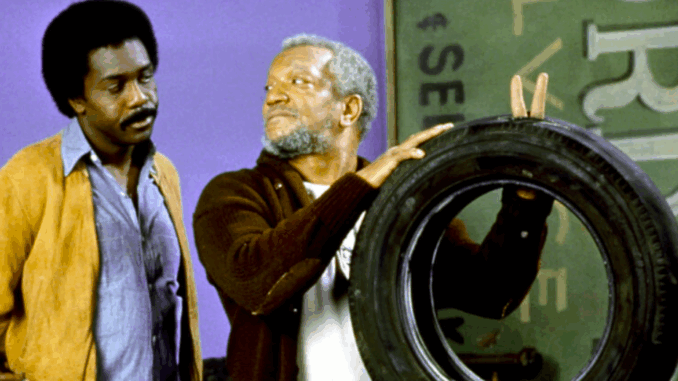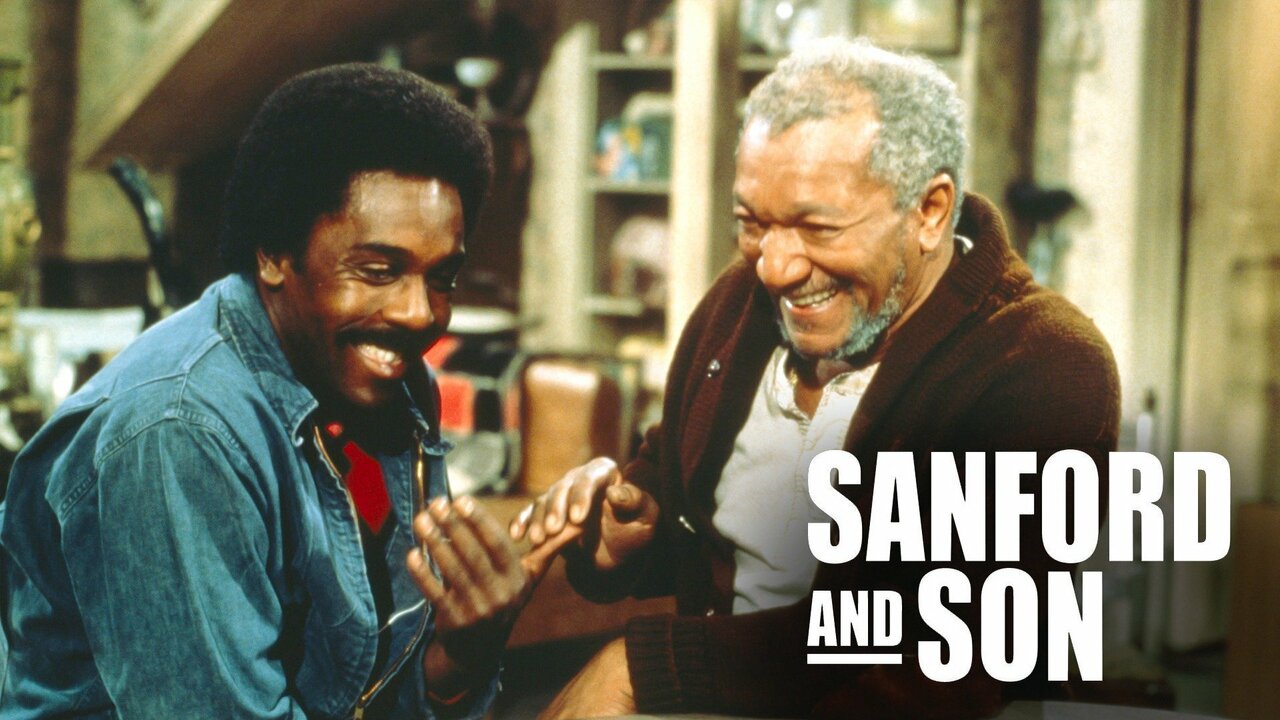
A Junk Dealer, a Big Mouth, and the Show That Took Over the 70s
When Sanford and Son first aired on NBC in January 1972, few expected a sitcom about a grumpy junk dealer in South Central Los Angeles to become one of the most-watched shows in America. But week after week, millions tuned in to watch Fred Sanford (played by Redd Foxx) bicker, scheme, and fake heart attacks as he clashed with his idealistic son Lamont.
It wasn’t just funny. It was explosive. It pushed boundaries. It made white audiences uncomfortable—and they couldn’t stop watching.
But behind the laughs and outrageous one-liners was a show fighting to stay alive, balancing groundbreaking representation with relentless off-screen tension.
Redd Foxx: From Raunchy Clubs to Primetime America
Before he was Fred Sanford, Redd Foxx was a legend on the Black comedy circuit. Known as the “King of the Party Records,” Foxx sold millions of underground comedy albums laced with profanity, sex jokes, and brutal honesty.
NBC was taking a wild chance casting him in a family sitcom. Foxx had never done network television. And he wasn’t interested in playing safe.
What emerged from that risk was a character both larger-than-life and deeply familiar. Fred Sanford was cranky, lazy, cunning, and unfiltered—but always charismatic.
Every time he clutched his chest and moaned “This is the big one, Elizabeth!” audiences howled. But Fred Sanford wasn’t just a joke. He was a Black man running a business, surviving in America, raising a son—and refusing to apologize for who he was.
The British Roots of a Black American Story
Sanford and Son was based on the British sitcom Steptoe and Son, which centered on a working-class junkman and his son. But Norman Lear, fresh off the success of All in the Family, knew that an American version had to reflect the racial realities of the U.S.
The decision to cast Black leads—Foxx as Fred and Demond Wilson as Lamont—was revolutionary.
This was not a fantasy world. The show was set in Watts, Los Angeles, just a few years after the 1965 riots. It didn’t hide its rough edges. Characters spoke in dialects rarely heard on network TV. And while the show relied heavily on slapstick and insult comedy, it also echoed the frustrations of a generation.
The message was clear: working-class Black America deserved to laugh, and deserved to be seen.
A Sitcom Fueled by Chaos

What made Sanford and Son great also made it volatile. Redd Foxx’s rebellious streak never softened, even when under contract. He clashed with producers. He walked off set. In 1974, at the height of the show’s popularity, Foxx left over a contract dispute.
NBC replaced him—temporarily—with guest stars, but ratings dipped. Eventually, Foxx returned… on his own terms.
Meanwhile, Demond Wilson, who played Lamont, grew frustrated with being overshadowed. By the time the show ended in 1977, he had cut ties with the production entirely.
Behind the laughter, there was constant conflict. But maybe that tension was part of the show’s spark.
A Voice That Mocked, Parodied, and Pushed Back
Sanford and Son was never politically correct. Fred Sanford hurled insults at his neighbors, mimicked white politicians, and threw around words that would never fly today.
He feuded with Aunt Esther, the Bible-thumping sister-in-law, calling her everything from “ugly” to “fish-eyed fool.” He poked fun at Asian and Puerto Rican characters, mocked police, and questioned government authority.
It was comedy wrapped in cultural defiance.
But it was also risky. Some critics accused the show of reinforcing stereotypes. Others saw it as subversion—Foxx using laughter to expose the absurdity of racism itself.
The truth is, Sanford and Son never tried to be a symbol. It was messy, loud, imperfect—just like America.
An Enduring Influence Few Acknowledge
Though it ended nearly 50 years ago, Sanford and Son still echoes through television. Its blend of physical comedy, biting insult humor, and generational conflict set the stage for shows like Martin, The Bernie Mac Show, and Black-ish.
Even today’s streaming comedies owe a debt to Foxx’s timing, charisma, and refusal to play by the rules.
Yet unlike All in the Family or The Jeffersons, Sanford and Son is often left out of serious discussions about television’s evolution. Maybe because it was never “respectable.” Maybe because it didn’t try to educate—it just made you laugh, then made you uncomfortable.
Final Thoughts: A Legacy Carried in Laughter and Grit
Sanford and Son wasn’t just about a father and son running a junkyard. It was about survival, stubbornness, and finding dignity through humor.
Fred Sanford didn’t offer sermons. He offered side-eyes and insults. But through that bluster, he carved out space for Black working-class families to exist on television—not as tokens, not as lessons, but as the messy, loving, hilarious humans they already were.
It was radical. It was risky. And it still matters.